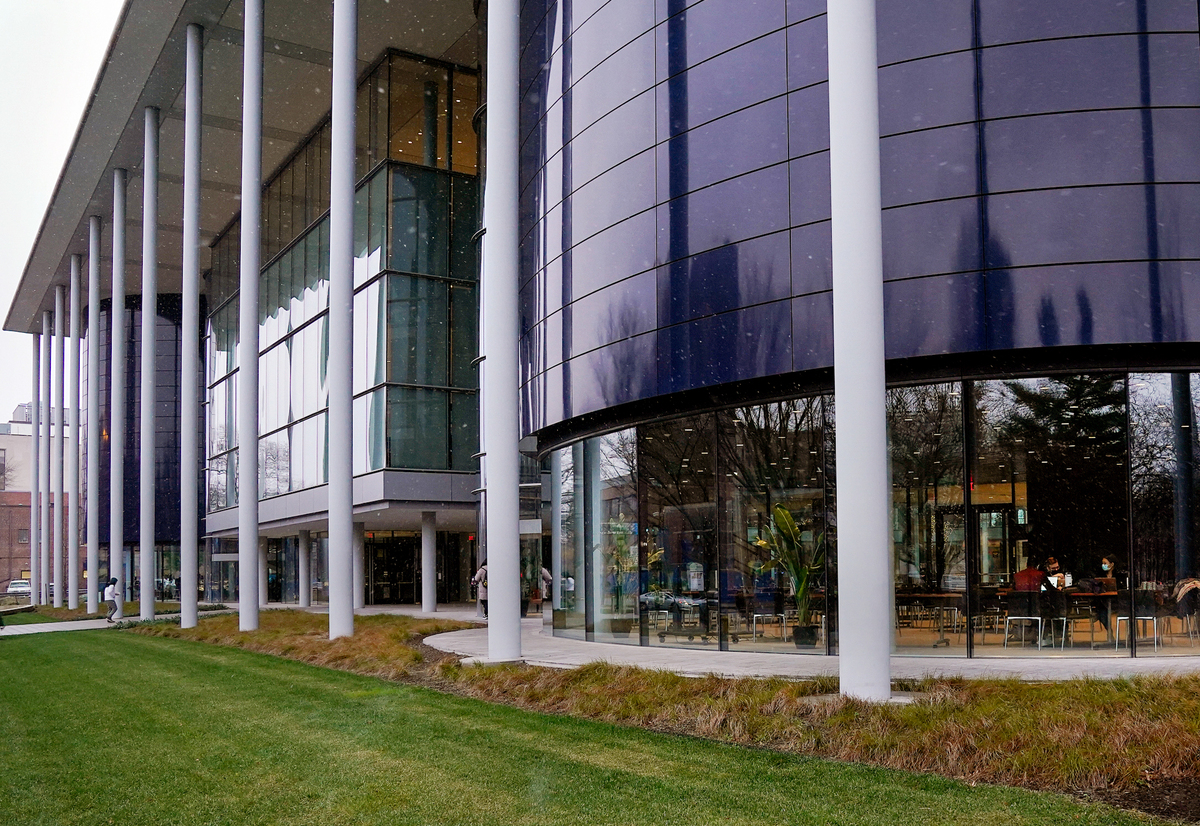Yale student podcast assesses whether successful entrepreneurs are born or made
A podcast by the Yale Entrepreneurial Society surveyed 60 students about their attitudes on what leads to success in entrepreneurship.

Tim Tai, Photography Editor
Nathaneo Johnson ’26 and Elena Derevianko ’25, co-hosts of the Yale Entrepreneurial Society podcast “The Founder Series” by the Yale Entrepreneurial Society, took advantage of the unseasonably warm weather two weeks ago to conduct a survey about entrepreneurship on Cross Campus.
For a podcast episode released today, Johnson and Derevianko surveyed 60 Yale College and Yale School of Management students on their opinions on whether entrepreneurs are born or made. The two were accompanied by their creative director, Sean Hargrow ’26, as they sought to compare Yalies’ attitudes with those of past guests on the podcast. While the opinions of CEOs that had appeared on the podcast previously were split, the majority of Yale students claimed that CEOs are made, according to Johnson and Derevianko.
“People can be nurtured into coming up with new ideas,” said Max Toatley SOM ’22.
Johnson and Derevianko rebranded the former YES podcast “Eli Speaker Series,” which focused on the career journeys of individual entrepreneurs. The new version of the podcast, “The Founder Series,” examines what it takes to be a successful entrepreneur more broadly. The podcast seeks to break through the “hype” around entrepreneurial success stories, they said, which often clouds the creative process of entrepreneurs in mystery.
CEOs and founders on “The Founder Series” had offered a number of opposing opinions on what it takes to be a successful entrepreneur, so Johnson and Derevianko wanted to gauge whether the Yale student body’s opinions were similarly diverse.
Most Yale students they spoke with expressed a belief in nurture rather than nature, pointing to the immense dedication and hard work that goes into transforming an idea into a product. Johnson and Derevianko said they were impressed by the consensus they found among their peers, which for them, indicated “a positive outlook for entrepreneurship at Yale.”
Johnson and Derevianko did not record numbers and instead favored qualitative research.
“How much you put into [your business] is what you get out of it,” Isiah Udofia ’26 said to the hosts.
Starting a company requires not only an investment of time and energy, he said, but also a tolerance of setbacks and a willingness to revise blueprints in order to introduce and scale a product effectively.
While students did not dispute the necessity of hard work, almost all students emphasized creativity as the characteristic trait of successful entrepreneurs.
Participants’ opinions diverged on the origins of creativity. Some said that the ability to invent ideas easily is a natural talent that cannot be learned, including Toatley, who said that “people are creative or they aren’t.”
Others said that, amid recent research, it seems increasingly plausible that creativity is a cognitive skill like any other that can be trained and perfected. According to Oleg Laskov ’26, large language models and generative artificial intelligence have reframed creativity as the probabilistic combination of pre-existing input to produce something original. He said that by exposing himself to as many innovative ideas as possible, the aspiring entrepreneur could prime himself to propose something novel.
Many surveyed students noted that entrepreneurship involves significant risk. Therefore, they said, an appetite for risk would contribute to one’s success as an entrepreneur. As dispositional traits, Johnson and Derevianko asked whether love of risk and aversion to risk distinguish the future Zuckerbergs and Musks at birth.
To this, entrepreneur and public figure Gigi Robinson responded with a resounding no. She argued that confidence informs one’s attitude towards risk — introspection and strength can help build this confidence.
Many students pointed to Yale as a location in which creativity can be incubated, given its resources for research and entrepreneurship. If creativity can improve as a result of exposure to innovative ideas, places like Yale would seem to drive this growth.
Chris Ricci SOM ’24 challenged the notion that environments such as Yale — where potential business partners and opportunities to acquire funding abound — are most conducive to entrepreneurial activity. Conditions of “extreme stress, pressure” and scarcity, rather, seem to drive people who might not have otherwise become entrepreneurs towards establishing businesses, according to Ricci.
Like statecraft or competitive sports, entrepreneurship is a collaborative enterprise that requires complementarity in its participants’ skill sets, Laskov concluded.
“The fox and the hedgehog together make for the best diplomacy, just as the innovator and the executioner make for the most impactful inventions,” Laskov said.
The Yale Entrepreneurial Society was founded in 1999 as a 501c3 nonprofit.







